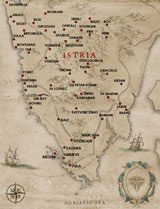to enlarge


or choose the place
from the menu below
 Rome |
 Byzantium |
 Venice |
 Vienna |
 Brioni |
 Smrikve |
 |
 |
During the Roman times it had 80000 inhabitants. This town was built as the base for the Roman conquers towards east.
Around Capitolium there were public baths, workshops, other public buildings and the residential quarters. The town had three large wells for the water and also the sewage system.
Nesactium is an important archaeological locality in Istria due to its importance in the Istrian history. Today only the ruins have remained but with a little bit of imagination you can rebuilt in your mind this antique town after the visit.
About 2000 years after Tito Livio described the Nesactium battle, a musician from Pula, Franci Blaskovic and his band Gori Ussi Winnetou, made its own interpretation of the epic battle based on historical traces left by the famous Roman chronician in his song "Epulon - kralj Histra".
Franci uses very coloured expressions to describe the Roman's decisions to conquer Istria. It is written in the history books that Histri tribes at the time robbed Romans ships but for sure this was not the main reason of their decision to conquer Istria. Roman Empire would have expanded anyway.
Franci also introduce the possibility that the name of the last Histri king might have been different because Epulon could be translated also as drankard thus he assumes in his interpretation that this name was probably given to him by Romans to belittle him.
Blaskovic also mix the time periods and make some ironic comparisons, use the expressions and wine names that did not exist at time, he also takes part of Histri side in the song. In my opinnion, in satire, hanging to contemporary facts sometimes broad the possibility to understand Franci's interpretation.
Tito Livio described the battle almost two centuries after the battle and Franci is interpreting Tito Livio's description 2000 years after him thus the real facts probably differs from both descriptions.